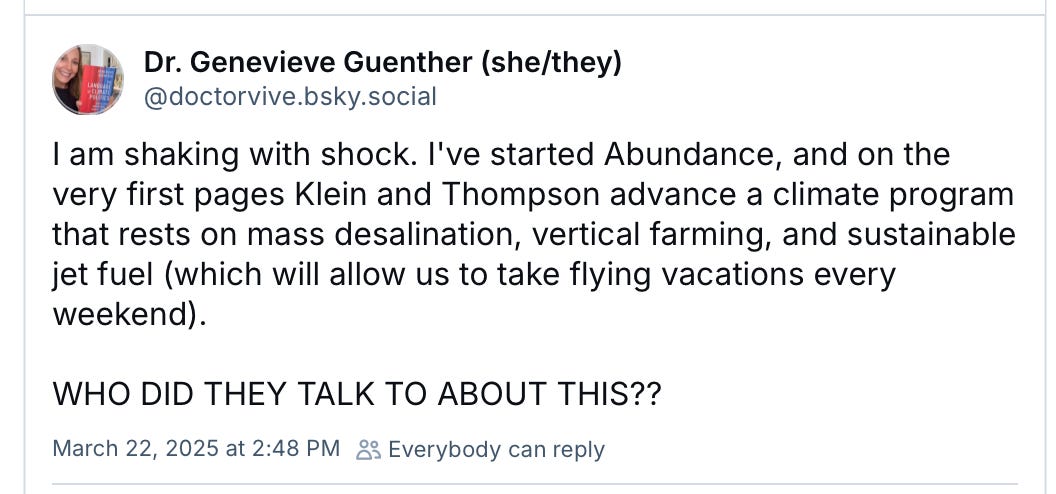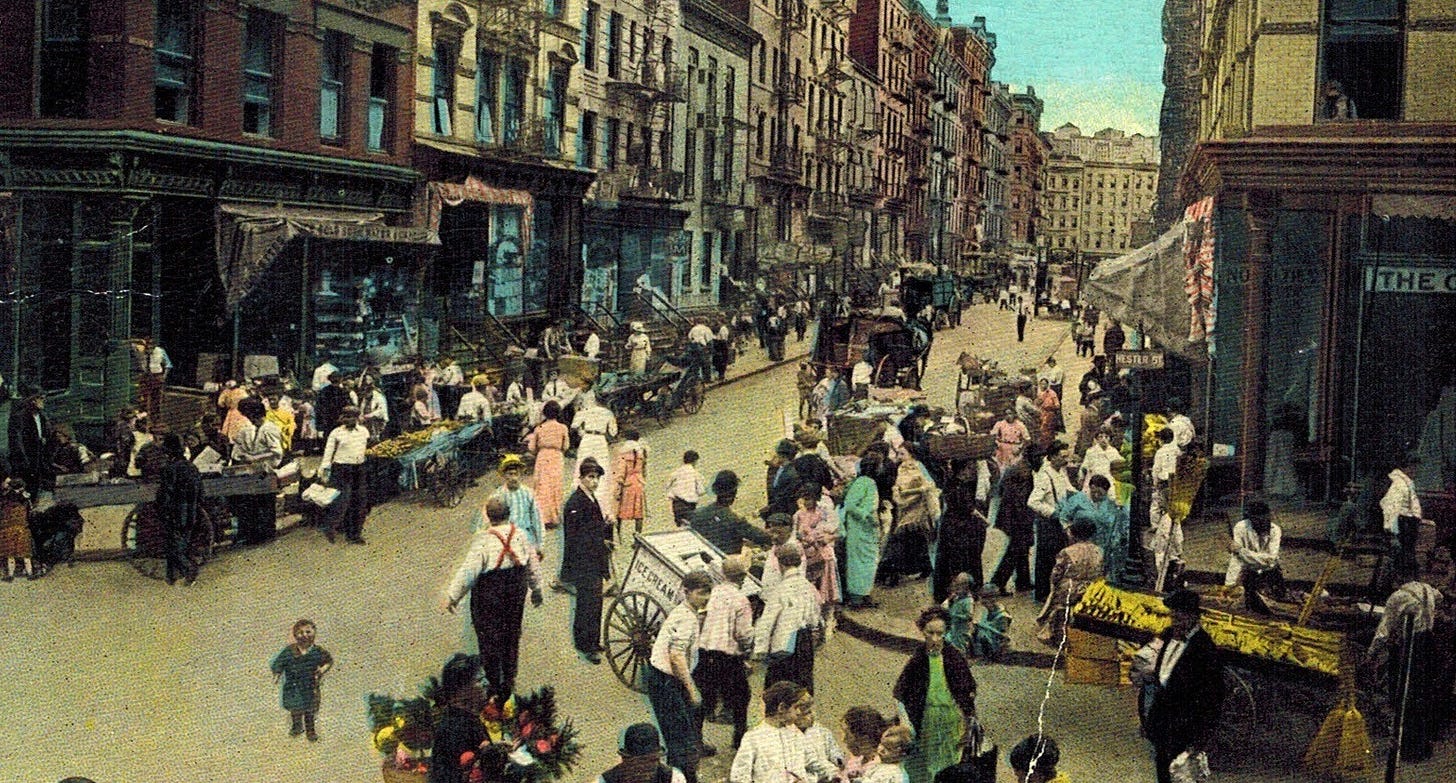Dr. Genevieve Guenther is unimpressed with the introduction to Ezra Klein and Derek Thompson’s book “Abundance.” It includes a vision of the future in 2050 with an abundance of everything: vegetables from vertical farms, water from desalinization plants, lab-grown meat, drone deliveries. Wait, there’s more!
Thanks to higher productivity from AI, most people can complete what used to be a full week of work in a few days, which has expanded the number of holidays, long weekends, and vacations. Less work has not meant less pay. AI is built on the collective knowledge of humanity, and so its profits are shared. Your friends are flying from New York to London. The trip will take them just over two hours. Modern jetliners now routinely reach Mach 2—twice the speed of sound—using a mix of traditional and green synthetic fuels that release far less carbon into the air.
Had they talked to me, I would have discussed the upfront carbon from making all this stuff, as well as the resources needed to run it. I have not finished the book, so I don’t know where the money or fuel comes from to fly everyone all over the world or how stealing Dr. Guenther’s and my books to train AI means they are the collective knowledge of humanity, so I will just discuss 2050 visions of the future.
UPDATE: I have finished the book, and I never learned the answers because they never mentioned them again.
These visions are often optimistic and uplifting descriptions of a greener future; a few years ago, Adam Vaughan of the New Scientist wrote a similar one titled Net-zero living: how your day will look in a carbon-neutral world. It described Isla, a young woman with a house, a car, and a job, drinking tea while surrounded by wind turbines and giant machines sucking carbon dioxide out of the atmosphere. I thought all of it sounded implausible and wrote my own version in 2021, starring my granddaughter Edie, now 5-3/4 years old.
Edie’s alarm goes off at 4:00 a.m. She gets up, folds up the bed in the converted garage in an old house in Toronto that is her apartment and workshop, and makes herself a cup of caffeine-infused chicory; only the very rich can afford real coffee.
She considers herself to be very lucky to have this garage in what was her grandparents’ house. The only people who live in houses these days either inherited them or are multi-millionaires from all over the world, but especially from Arizona and other Southern states, desperate to move to Canada with its cooler climate and plentiful water and who can afford the million-dollar immigrant visa fee.
She hurries to prepare her pushcart, actually a big electric cargo bike, filling it with the tomatoes and preserves and pickles she prepared with fruits and vegetables she bought from backyard gardeners. Edie then rides it downtown where all the big office buildings have been converted into tiny apartments for climate refugees. The streets downtown look very much like Delancey Street in New York looked like in 1905, with e-pushcarts lining the roads where cars used to park.
Edie is lucky to be working. There are no office or industrial jobs anymore; Artificial Intelligence and robots took care of that. The few jobs left are in service, culture, craft, health care, or real estate. In fact, selling real estate has become the nation’s biggest industry; there is a lot of it, and Thunder Bay is the new Miami.
Fortunately for Edie, there is a big demand for homemade foods from trustworthy sources. All the food in the grocery stores is grown in test tubes or made in factories from who knows what. Edie sells out and rides home in time for siesta. There may be lots of electricity from wind and solar farms, but even running tiny heat pumps for cooling is really expensive at peak times. The streets are unpleasantly hot, so many people sleep through the midday.
She checks the balance in her Personal Carbon Allowance (PCA) account to see if she has enough to buy another imported battery for her pushcart e-bike after her nap; batteries have a lot of embodied carbon and transportation emissions and might eat up a month’s worth of her PCA. If she doesn’t have enough then she will have to buy carbon credits, and they are expensive. She sets her alarm for 6:00 p.m. when the streets of Toronto will come alive again on this hot April day.
I wrote that four years ago, but I don’t think I would change much today, other than the bit about visas; after the USA invasion and occupation, the Arizona refugees won’t need them.
In my book, The Story of Upfront Carbon, I described a world designed to consume less and produce fewer carbon emissions. The book is all about sufficiency, and the subtitle is “How a life of just enough offers a way out of the climate crisis.” It is a different version of the future; I mention a different kind of abundance, quoting Australian philosopher Samuel Alexander:
"This would be a way of life based on modest material and energy needs but nevertheless rich in other dimensions—a life of frugal abundance. It is about creating an economy based on sufficiency, knowing how much is enough to live well, and discovering that enough is plenty”
It’s a lot more plausible and good for a lot more people than the kind of abundance being pitched by Klein and Thompson. It’s time to update and expand Edie’s 2050 story; watch this space.






I notice that the optimistic future visionary types tend to imagine a world where AI and machines do all the work for us and we having nothing but time and resources to “enjoy” a life of leisure on the backs of their labour. Does anyone else see a problem with these visions. To me they mostly describe a saccharin dystopia devoid of meaning or purpose. No one seems to pick up on the simple reality that humans are lost without meaningful work. We fall into an abyss of self doubt and self and other abuse very quickly when idle for long or when we don’t feel we are contributing. Our behaviour becomes profoundly self destructive and social order crumbles. Meaningful work can be simple manual labour or require deeply complex thought but doing it is essential to our well being. Work should have important purpose and give people a sense that they are contributing something to their own welfare and that of their community. It is something to be sought out and embraced not shunned. We are transforming our world and adapting ourselves for the benefit of machines on the notion that we will be happier or generally better off doing less work. I am not a Luddite but I I think that is deeply misguided.
I think you're absolutely right! The utopian version of the future has been promised since The Jetsons, but our current reality seems to be about exploiting machines, AI, and other tech to make the rich richer and everyone else dependent on oligarchs for food, money, and housing.